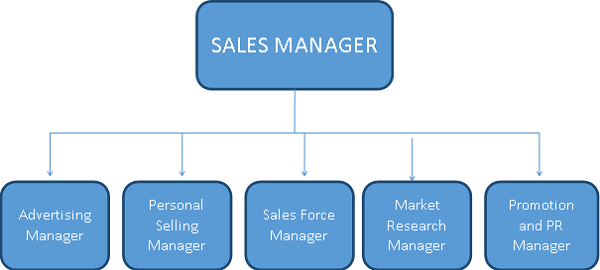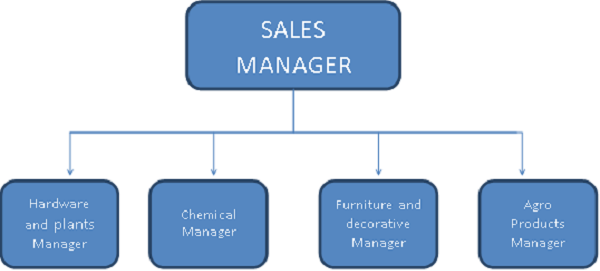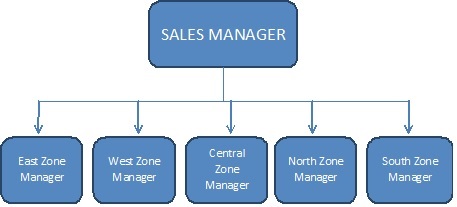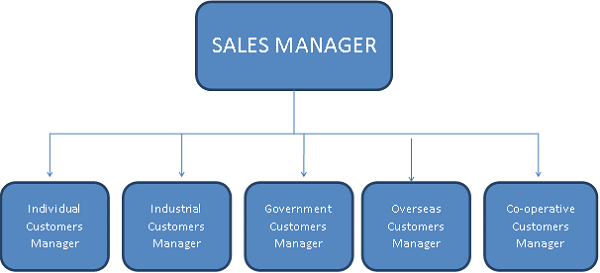
Sales & Distribution Mngmt - Organization
Sales organization is a department in company within logistics that designs the company as per the sales requirements. Sales organization is held responsible for the sales and distribution of goods and services.
The selling unit is represented as a legal unit. The salesperson plays a crucial role in the sales company because he/she is answerable for many activities in the company. Some of those activities can be listed below.
Setting selling and profit objectives − The salesperson is involved in setting the objectives of selling the product and generating the profit.
Marketing policies − The salesperson has to set the marketing policies and plan accordingly.
Designing personal selling strategies − They also have to set up their own strategy to generate sales and to target and retain the customers.
They co-ordinate with other departments as well, for example, advertising, sales promotion and distribution, to chalk out a sales programme, which helps in generating sales. It also helps to find any loop holes and fix the issues.
Characteristics of a Sales Organization
Let us now understand the characteristics of a sales organization −
A sales organization subsists of a group of people who handle different activities like distribution, advertising selling etc.
It works to achieve the sales objectives, like increasing sales volume and maximizing profit and market share of the company.
It specifies the responsibilities and duties of the salesperson and also co-ordinates their activities with other departments.
It helps to develop a relationship with the other personnel in the organization by setting up a sales programme.
General Sales Manager is the head of the sales organization.
Thus, sales organizations help the company in achieving targets and building coordination with sales personnel. Now we shall see the importance of sales organization.
Significance of Sales Organization
Let us now understand the significance of sales organization.
To plan purchase
The sales of the company depend on the sales anticipation. The sales will increase only when the consumer purchases the goods or services. Therefore, the company has to plan the sales according to the consumer need and want, meaning where they want the product, what they want etc. The planning and development is done accordingly to satisfy the need of consumer.
To create pattern of demands for products
The demand of the product is created to lead to sell in the market. When a product is manufactured in the factory, it is not sold automatically. Salespersons push the product to consumers. But even they cannot force the consumer to buy the product. The sale depends on the consumers need and perception. This need is created by the selling skills, promotions through advertisements, etc., which in turn help in creating demand in market.
To handle the orders received
This is an important step where the salesperson has to answer the calls and queries of the customers, receive orders and make the product ready as per the demand of consumers.
Finally, the products are packed and dispatched as per the expectation of consumer; all these are imperative and effective tasks.
To collect the dues
Sales cannot always be done for cash. Bulk sales are made on credit. Its very difficult for an organization to perform only on the basis of cash sales; in this competitive market, credit sales play a crucial role.
After the credit sales have been done, the organization has to collect dues. It is a very challenging task as the salesperson has to retain the business and still get the task done.
To handle the task of personnel management
Every organization wants best sales personnel to enhance the sales. This depends on training. The organization has to select, train, motivate, monitor and control its sales personnel. Here the company has to make an investment in sales personal.
In summary, we can conclude that there is an immense impact of sales organization on a company.
Types of Sales Organization
An organization is designed in a manner where we can identify the work or activity performed by an individual or group. The roles and responsibilities are defined, which helps in building relationships to enable people to work effectively and efficiently. This helps in achieving the goals of the organization. The following are the four types of sales organizations −
Functional Type
Functional type of organization is divided and classified on the basis of the functions performed. The following illustration shows a functional type organization.

This depicts the functional type organization. We will now discuss the advantages and disadvantages of this type.
Advantages of functional type
The following are the advantages of a functional type of organization −
Specialization − In the figure, we can see the division has been made according to the functions. By this, we can expect each function is specialized in its activity.
Flexibility − The number of departments can be added or removed as per the requirements.
Decision making − Decisions can be made quickly as the person would be an expert in his department and will be aware of the impact of his decision.
Co-ordination − The co-ordination between functions can be done easily
Disadvantages of functional type
Let us now understand the disadvantages associated with functional type of organization −
Due Attention − Each department is only specialized in their own activity; hence there is no attention focused on the product.
Delay − There is delay in making decisions because of co-ordination between all the departments.
Co-ordination − From the figure, we can see that all departments report to the General Manager. Therefore, .in peak times, it may become difficult for the General Manager to maintain co-ordination between the departments.
Conflicts − There is always conflict between departments due to being specialized only in one core area and lack of cross training.
In general, functional type of organization is suitable where the organization structure is small having limited products.
Product Type
This type of division is made according to the products. The organization divides the departments based on the products.
The following illustration shows the layout of the product type.

Advantages of Product Type
Due Attention − Due to the division according to the product, each product gets required attention.
Specialization − The salesperson is specialized in specific products; hence he/she has an advantage in handling the department.
Responsibility − The responsibility can be easily assigned to a salesperson because all the salespersons are specialized in their product/ department and are well acquainted with the product, which helps them to handle customers smoothly.
Disadvantages of Product Type
Co-ordination − There would be problem of co-ordination between two product departments.
Selling Cost − The selling cost of product may increase due to the division according to the products.
Operational Cost − Operational cost may also increase due to each product being treated differently.
Freedom − There is no cap on the freedom enjoyed by employees because the salesperson is specialized only on his/her product/department and will not be able to handle other product/department.
Suitability of Product Type
Product type is suitable in the following cases −
Where the organization has many products and it can divide the departments according to the products.
For organizations selling highly priced products.
When the products of an organization are more technical oriented, the organization can divide the departments according to the products as the salesperson will be efficient and effective to discuss the product with the customer in an effective way.
Consumer Specialization Type
According to consumer specialization, the departments are divided on the basis of the costumers to whom the products are offered. Most of the time, market appearance plays an important role in knowing the consumer needs and to divide the departments accordingly.
The following illustration shows the layout of the consumer specialization type.

Advantages of Consumer Specialization Type
Consumer − Here the division is according to consumers, so each consumer gets due attention.
Consumer satisfaction − Consumer satisfaction is the first priority; as maximum services are provided to the consumer.
Planning and policies − The sales planning is done in a proper way and policies are designed keeping each category in focus to achieve the goal.
Brand − The organization is able to fulfil consumer needs and wants and create its own brand to gain market share.
Disadvantages of the Consumer Specialization Type
Expenses − The expenses for the company to build and plan according to consumer and develop the market are huge.
Sales activities − It becomes difficult for the sales manager to co-ordinate the sales activities of salesperson.
Investments − In this case of specialization, the investments are high and sometimes repeated, which in turn, is loss to the company.
Suitability of the Consumer Specialization Type
Consumer type is suitable in the following cases −
- When there is a large number of consumers who are looking out for special services.
- The costumer is ready to pay for the services offered. Here, the target is mostly premier customers.
Area Type
In this type of organization, departments are divided accord ing to the attributes of areas. They can also be divided geographically. The following illustration shows the layout of the area type organization.

Advantages of Area Type
Products − Customers can be served with the latest products and customized products.
Transport cost − Transport cost can be reduced because the division has been made according to areas.
Customer service − Company can provide better customer services as the division is made according to area. Thus, the company can understand the customer psychology and perception better.
Sales performance − The sales performance can be compared according to zones and steps can be taken to improve.
Disadvantages of Area Type
Costly − It is costly as compared to other types and increases expenses of the company.
Markets − It becomes difficult for co-ordination for the General Manager for different markets.
Conflicts − There may be conflicts regarding resource allocation between zones.
Suitability of Area Type
The area type of organization is suitable in the following cases −
- When the area or the territory for market is very large.
- Where the market is different based on zone.
- Where the product is differentiated depending on zone.
- Where the sales volumes are high and generate more revenues.